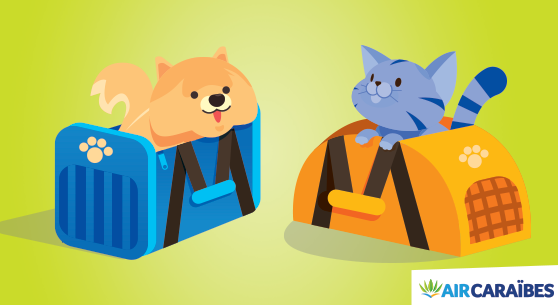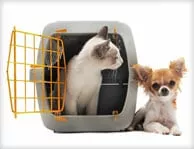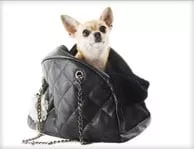Animals

To find out whether an animal can travel in the hold or in the cabin, it is imperative to indicate its presence when booking your flight ticket.
The company reserves the right to refuse an ESAN (Emotional Support Animal).
Pets authorized to travel in the hold are dogs and cats only (subject to acceptance by the company). Animals authorized to travel in the cabin are dogs, cats, dwarf rabbits and guinea pigs only. Only animals that are calm (not noisy or aggressive) and obey the rules of hygiene (clean and odorless) will be accepted on board. All other animals must travel FRET, see our FRET service contact details.
Please note for code share flights with French bee: only dogs and cats will be allowed. No other animals will be accepted by the company.
If you are traveling to or from the United States with your dog, new requirements have been put in place by the CDC (Center for Disease Control), all the information here
Prerequisites
Before your departure, you must ensure that you are in possession of all the travel documents required to cross the borders of the departure, arrival and transit countries where applicable.
In addition to an identity document and a health record, some countries may require, though the following list is not exhaustive, a passport, visa, proof of parentage, health and customs documents, proof of adequate insurance, hotel reservations or proof of accommodation as well as minimum means of subsistence.
It is the sole responsibility of the traveler to check that they are due and valid according to the laws and regulations in force, and if necessary to request their renewal within the allotted time.
⚠️ Travelers, do not bring back an animal from a country affected by rabies. Remember to have your pet vaccinated when you travel abroad.

The animals authorized to travel in the hold (AVIH, or animal in hold) are dogs and cats only (subject to acceptance by the company). The size and weight of the animal traveling in the hold will determine its disposition for transport (subject to quotas).
Fee: €150 / trip, non-refundable.
Indicate breed, weight and cage dimensions in the application. Transportation is not included in the baggage allowance.
AVIH are accepted on a Train + Air route. Animal cages and bags are on sale in pet shops and specialized stores.
1 - On transatlantic flights, all dogs and cats belonging to a snub-nosed breed* are forbidden in hold and FRET, their brachycephalic (snub-nosed) morphology is not adapted to withstand transport in hold.
*List of snub-nosed animals not accepted in hold on transatlantic flights:
- The dog breeds concerned are: Affenpinscher, Boston terrier, Boxers (all breeds), Bulldogs (all breeds), Bull mastiff, Cane corso, Carlins (all breeds), Chow-chow, Mastiffs (all breeds including Presa Canario or Canary Dog), certain breeds of Spaniels (Tibetan, Japanese, English, King Charles), Griffon bruxellois, Ihassa apso, Mastiffs (all breeds), Neapolitan Mastiff, Pekingese, Petit Brabançon, Shih tzu, Shar pei, Staffordshire Bull terrier (staffy), American Bully.
- The cat breeds concerned are: Burmese (Burmese), Exotic shorthair, Himalayan, Persian.
2 -Admission for carriage of pets is subject to the passenger assuming full responsibility for them.
3 - The carrier assumes no responsibility for injury, loss, delay, illness or death of such pets. The same will apply if entry or transit is refused into any country a state or territory.
4 - The carriage of animals in the hold is prohibited on board St Barth Commuter flights. In addition, given the limited space in baggage compartments, cages (even empty ones) are strictly forbidden on these flights.
5 - The carriage of animals under 8 weeks old** is forbidden.
6 - For animals older than 8 weeks**, the following documents will be required at check-in:
- Mandatory identification (microchip)
- Certificate of valid rabies vaccination more than one month and less than one year old, mandatory for animals coming from : Guyana, St-Martin, St-Barthélémy and other countries. With the exception of Metropolitan France, Martinique, Guadeloupe and Reunion.
ATTENTION: Passengers are advised to carry only healthy animals (at least 8 weeks old**: for reasons of dehydration). The transport of malodorous animals is forbidden. Transporting females in heat is forbidden.
- Animal and owner must travel on the same flight.
Sedatives are not recommended for animals (as they lower blood pressure, a phenomenon naturally occurring at high altitude). The combination of the effects of sedatives and altitude can be fatal to elderly or simply stressed animals.
**Only on flights operated by Air Caraïbes.
The use of a wooden cage (chipboard or plywood) is strictly forbidden when transporting an animal. In addition, the cage must have appropriate dimensions that will allow (a fortiori for two animals) the animal to lie down, turn around and stand upright, with its head normally erect without the animal's head or ears touching the ceiling of the cage.
For information, you will find, by clicking here, the different cages appropriate to the type of animal.
NB:
- The cage must bear the name and address of the owner.
- 2 adult animals may cohabit in the same cage, only on the transatlantic network, provided: they are of comparable sizes, respective weights less than 14Kg, accustomed to cohabiting and according to the cage conditions defined above. Animals weighing more than 14kg must be placed in separate cages. A fixed fee of €150 will be charged for each animal transported (i.e. €300 for two animals).
All other animals, as well as large dogs not acceptable in a N°5 cage (or Ref 700) or in a cage made according to the model and standards given in the LAR (Live Animals Regulation), must travel by FRET.
- Transport of AVIH (animal in hold) on Transatlantic flights:
The maximum weight authorized for the transport of AVIH (animal in hold) on transatlantic flights is 75KG (weight of the animal and cage type n°5/Ref 700 included) beyond this, transport must be by FRET.
The entry/exit waiver is mandatory for AVIH on transatlantic flights to Saint-Martin ( SXM )
Animals belonging to the snub-nosed breed are prohibited in the hold.
- Transport of AVIH ( animal in hold) on the Regional :
The maximum weight authorized for transporting AVIH on the regional network is 50KG ( weight of animal and cage included )
The entry/exit waiver is not mandatory for AVIH on inter-island flights Saint-Martin ( SFG ) to Pointe-à-Pitre ( PTP) /Fort-de-France ( FDF ) and vice versa
As a reminder:
- It is important to take care of your pet before the trip
- The transport of your AVIH in case of connection to and from the Long-Courier will only be carried out if the connection time is less than 02 hours.
- If the connecting time to and from the Long Courier, is more than 02H00, you, your luggage and your AVIH will be checked in at the connecting point.
- The closure of your AVIH's cage must be secure, otherwise make sure to use tyrap type self-locking fasteners.
Pets belonging to the snub-nosed breed are accepted in the hold provided there is no connection on a long-haul flight.
-On Short-haul flights, the animal in the hold is not included in the baggage allowance, click here to consult our excess baggage rates.
- Flat rate: €20 / trip, non-refundable.
-On transatlantic flights, transportation is not included in the baggage allowance:
- Flat rate: €150 / trip, non-refundable.
- Indicate breed, weight and cage dimensions in the request.
- Pet cages and bags are on sale in pet shops and specialty stores.
- Train + Air:
You travel with a pet:
Pets are accepted on board the train.
- They must be: Placed in a cage or basket whose dimensions do not exceed 45 x 30 x 25 cm.
- Or kept on a leash and fitted with a muzzle. For passengers accompanied by an assistance or guide dog, muzzling is not compulsory. The SNCF fare applies to animals (payment at the SNCF station). Do you also have a plane trip?
Pets in the hold (AVIH) are accepted on a Train + Air journey.

Pet-in-cabin (PETC) animals include dogs, cats, dwarf rabbits, guinea pigs and hamsters only. Please find below our conditions of carriage for pets in the cabin (subject to quotas).
Tariff on the Transatlantic network: €75 / trip (subject to quotas, non-refundable).
Pets with snub noses*, such as pug dogs, bulldogs, boxers, Pekingese, shih tsu or Persian cats, are accepted in the cabin, but in case of stress they may suffer from breathing difficulties. It is therefore advisable to seek veterinary advice before flying. The company accepts no responsibility in the event of an accident.
Rodents must be transported in rigid plastic crates or fiberglass crates. Transportation is not included in the baggage allowance. PETCs are accepted on a Train + Air itinerary.
Subject to formalities being in order, the following are accepted as PETC, ONLY:
- Dogs and cats weighing a maximum of 5kg on the regional network and 8kg on the transatlantic network, container included. The animal must be enclosed in the container head included for the duration of the flight and must travel at the passenger's feet.
- Small rodents (dwarf rabbits and guinea pigs = guinea pigs), to the exclusion of all other rodents and animals. They must be placed in a fiberglass or plastic crate (sold in pet shops) for small rodents. They must be kept in the crate for the duration of the flight.
- UMs may not be accompanied by animals in the cabin
- The carriage in the cabin of dogs accompanying the blind or hearing-impaired is free of charge. The passenger must present a medical certificate.
Please note: for regional flights (Medium-haul & Short-haul), in the event of disruptions and at the captain's discretion, your pet may be placed in the hold.
- The carriage of animals under 8 weeks old is prohibited.
- Concerning code share flights with French bee, only cats and dogs are accepted in the cabin. All other animals are strictly forbidden (possibility of traveling by FRET).
- For animals over 8 weeks old, the following documents will be required at check-in:
- Mandatory identification (microchip)
- Certificate of valid rabies vaccination more than one month and less than one year old, mandatory for animals coming from : Guyana, St-Martin, St-Barthélémy and other countries. With the exception of Metropolitan France, Martinique, Guadeloupe and Reunion.
All these documents must be presented at check-in. Transportation must be requested at the time of booking, and authorization must be obtained (in order to comply with flight quotas).
Transportation is not included in the baggage allowance.
Transportation of PETCs to emergency exits is prohibited.
The bag must be placed under the seat and the animal must under no circumstances leave its bag.
Rodents must be transported in rigid plastic crates or fiberglass crates.
Cats and dogs in the cabin must travel in an approved transport bag.
As of 02/06/2023 passengers travelling with pets may not reserve emergency exit seats and in some cases front rows.
Pet bags are available from pet shops and specialist stores.
Only soft bags not exceeding 5 kgs (including pet) on regional flights and 8 kgs on transatlantic flights will be accepted. The following dimensions: 43 x 35 x 20 cm will be allowed.
The entry/exit waiver is mandatory for PETCs on transatlantic flights to Saint-Martin (SXM )
The entry/exit waiver is not mandatory for PETCs on inter-island flights Saint-Martin ( SFG ) to Pointe-à-Pitre ( PTP) /Fort-de-France ( FDF ) and vice versa
Acceptance and taxation
Transatlantic: €75 per trip (subject to quotas, non-refundable).
Short-haul: €10 per trip (subject to quotas, non-refundable).

In this section, you will find the new provisions applicable as of June 6, 1999 regarding dogs likely to be dangerous (Law n°99.5 of January 6, 1999: source Journal Officiel).
The types of dogs likely to be dangerous are divided into two categories. These are mastiff-type molosses, defined by a massive, thick body, a strong bone structure and a thick neck.
Dogs in both categories may not be owned:
- Persons under the age of 18.
- Adults under guardianship unless they have been authorized to do so by the guardianship judge.
These are the dogs commonly known as "Pit-bull", "Boer-bull" and "Tosa" that are not registered in a herd book recognized by the Ministry of Agriculture and Fisheries constituting the 1st category.
The import and introduction into metropolitan France, the overseas departments and the territorial collectivity of Saint-Pierre et Miquelon of dogs in the first category mentioned in article 211-1 is punishable by six months' imprisonment and a fine of 15,245 Euros.
These are Staffordshire terrier, American Strafforshire terrier, Rottweiller and Tosa dogs, and dogs similar in morphological characteristics to Rottweiller dogs without being registered in a herd book recognized by the Ministry of Agriculture and Fisheries.
These dogs may be imported or introduced into metropolitan France, the overseas departments and the territorial collectivity of Saint-Pierre and Miquelon under the following conditions:
- Only the owner is able to travel with the animal
- Livret d'origines françaises, with the exception of Rottweillers
- Identification of the dog by microchip
- Certificate of valid rabies vaccination dating from more than one month and less than one year
- Presentation of an insurance certificate guaranteeing the dog owner's civil liability, for damage caused to third parties by the animal
- Permis de détention issued by the mayor of the owner's place of residence
- Attestation d'aptitude du propriétaire
- Evaluation du comportement de l'animal par un vétérinaire habilité.
The request for transport must be made at the time of booking (0 820 835 835 - €0.12/min) and authorization must be obtained in order to respect flight quotas. All these documents must be presented at check-in.
- Transport of AVIH (animal in hold) on Transatlantic flights:
The maximum weight authorized for the transport of AVIH (animal in hold) on transatlantic flights is 75KG (weight of the animal and cage included) beyond this, transport must be by freight - Transport of AVIH (animal in hold) on Regional flights:
The maximum weight authorized for the transport of AVIH on the regional network is 50kg (weight of animal and cage included) Transport of 2nd category dogs ( AVID ):
Only the owner is able to travel with the animal.
Tariff on the Transatlantic network: €200 / trip (subject to quotas, non-refundable).
- Fixed price: €200 / trip, non-refundable.
- Indicate breed, weight and cage dimensions in the request: SRAVID-RACE WEIGHT DIMENSIONS
- Pet cages and bags are available from pet shops and specialist stores.
After entering the AVID request in the PNR, you must email the Special Transport department the requested documents: transportspeciaux@aircaraibes.com.
The transport agreement will be given after verification of the quota and all the documents transmitted.
All these documents must be presented at registration.
Dogs must be muzzled and kept on a leash at all times by a person of legal age.
Not considered dangerous dogs:
Bullterriers, American Bully and American Staffordshire Bullterriers, which resemble miniature American Staffordshire Terriers.
All animals entering the Netherlands must be in possession of the "Application for permission to import animals" form, duly completed and validated by the authorities in charge.
This document must be completed by you and then sent up to 4 days before each flight, by email to: mervyn.butcher@sintmaartengov.org and ivv@sintmaartengov.org.
You will then receive a reply by e-mail with the approval of the authorities.
No additional cost is due, all airlines in the territory are subject to this rule.
In the absence of this document, or if it has not been validated before entering the territory, animals will be quarantined or turned away.
Click here to download the "Application for permission to import animals" form.
Concerning domestic carnivores accompanying travelers
The animal must:
- be identified by a microchip
- be correctly vaccinated against rabies (validity starts 21 days after the 1st vaccination)
For animals coming from a third country (Surinam and Brazil, for example), the animal must:
- be at least 7 months old
- be identified
- be correctly vaccinated against rabies (valid vaccination certificate + rabies antibody titration result)
- have a health certificate from the official authorities of the third country
- have a current certificate of good health for the animal
Special case: returning a domestic carnivore to French Guiana after a stay in a third country, the animal must:
- be identified
- be correctly vaccinated against rabies (valid vaccination certificate + rabies antibody titration result)